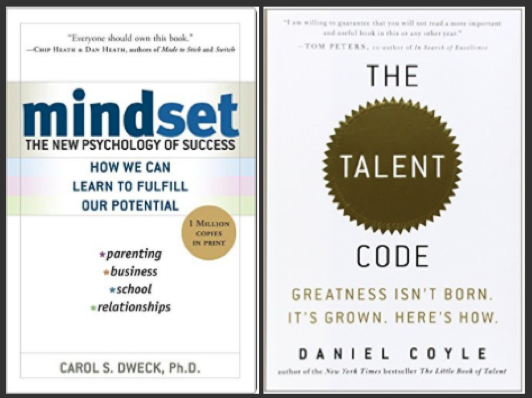May 27, 2016
Achieving Peak Mental Performance – Factor #7: Let ’em struggle
The Growth Mindset – 7 Key Factors to Achieve Peak Mental Performance
 |
Factor #7 – Creating the mindset of an expert – by letting ’em struggle
One of my favorite movies is My Cousin Vinny (OK I know I’m dating myself a bit.) Vinny struggles in the courtroom because he has no experience. That is until the topic switches to something that he and his foot-stomping ‘my biological clock is ticking’ fiancé are experts in – cars. Then the entire mood shifts. Vinny’s demeanor changes from someone who is overmatched and overwhelmed to a confident and brash attorney.
–
Athletes can have the same type of overmatched and overwhelmed feeling in a game since they probably aren’t experts at their sport yet. So how can you help switch their mindset so they feel like they are an expert? This is where I rely on experts such as Daniel Coyle in The Talent Code and Carol Dweck in Mindset. Coyle debunks the 10,000 hour rule myth, citing:
‘The real goal: finding ways to constantly reach past the edge of your current ability.The real lesson of 10K is not about quantity; it’s about quality. It’s about getting the maximum possible gain in the shortest amount of time — and to get that, you don’t focus on the time, but on the gain. You put your focus on improving the practice, which happens two ways: through better methods or increased intensity.To be clear:1. Certain kinds of learning — deep, or deliberate practice — are transformative.
2. That transformation is a construction process.
3. That construction process depends on your intensive reaching and repeating in the sweet spot on the edge of your ability.’
–
Did you catch that: ‘intensive reaching and repeating in the sweet spot on the edge of your ability.’
–
Building a mentally strong athlete means you have to let them struggle. Not a struggle of despair and stress of trying to accomplish the impossible, but rather a struggle of trying to accomplish a task that is just out of reach of their current ability. And here is where Dweck’s research ties in – the only way they are going to be able to reach that next level is by problem solving. Trial and error. Failures turned into successes.
–
So to be a master coach – you have to be constantly evaluating where your team and each athlete is at, and figure out how to stretch them into that ‘sweet spot on the edge of their ability.’ Here a few practical ways some of the coaches I have interviewed do this:
- Construct developmental stages that kids graduate from.
- Melody Shuman, founder of a martial arts school called Skillz Connect, identifies 7 or 8 skills appropriate for the age. She uses the Goldilocks concept to define these skills – Not too hot, not too cold, but just the right level that is a slight challenge, but attainable. Then she will focus on one of these in each practice. They have a test at the end of the practice, and if they pass they get their ‘stripe’ for that skill.
- After they have passed the test for each of the skills, they graduate to the next level. Moving up a level is a big recognition and there is a group celebration.
- Spend the time listening to 2 great podcasts on this subject:
- Melody Shuman, WYC episode 64 – Check it out
- Robert Murphy, WYC episode 69 – Check it out
- Lee Miller from Elite Hoops Basketball calls it ‘Living by numbers’ – They have created 15 core drills that can be measured numerically. They keep track of the results, then they focus on improvement.
- Fear of failure- Great analogy – Olaniyi Sobomehin, former Saints’ running back and founder of I’mNotYou.com, said his son hates to lose and might quit in the middle of a race. So he used the analogy of how obsessed his son is with Mario Kart to beat a level – when he fails to complete a level – he doesn’t quit, he keeps pushing reset until he eventually will beat the level. So use this analogy to show your athlete the type of passion you need to accomplish something – quitting is the only way you will fail.
- Scott Rosberg from Proactive Coaching reinforced that as a coach, be sure to use the words: ‘Look what you’ve become!’ or ‘Look what you were able to figure out’ – instead of taking any credit yourself.
There may be no bigger confidence builder than overcoming an obstacle and solving a problem. So let ’em struggle, then celebrate like crazy when they figure it out.
–
I hope you have learned as much from this series as I have in doing the research on it. If you missed any of the previous factors check them out here:
5. SIMPLIFY!
